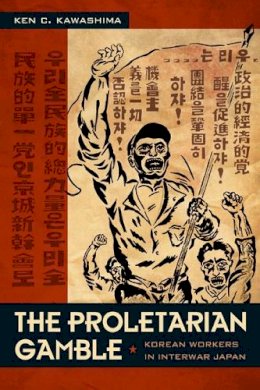
The Proletarian Gamble: Korean Workers in Interwar Japan
Ken C. Kawashima
Kawashima draws on previously unseen archival materials from interwar Japan as he describes how Korean migrants struggled against various recruitment practices, unfair and discriminatory wages, sudden firings, racist housing practices, and excessive bureaucratic red tape. Demonstrating that there was no single Korean “minority,” he reveals how Koreans exploited fellow Koreans and how the stratification of their communities worked to the advantage of state and capital. However, Kawashima also describes how, when migrant workers did organize—as when they became involved in Rōsō (the largest Korean communist labor union in Japan) and in Zenkyō (the Japanese communist labor union)—their diverse struggles were united toward a common goal. In The Proletarian Gamble, his analysis of the Korean migrant workers' experiences opens into a much broader rethinking of the fundamental nature of capitalist commodity economies and the analytical categories of the proletariat, surplus populations, commodification, and state power.
Product Details
About Ken C. Kawashima
Reviews for The Proletarian Gamble: Korean Workers in Interwar Japan
Mark E. Caprio
Acta Koreana
“[F]irst-rate, indispensible reading on Korean workers in the Japanese empire. . .”
Jinhee Lee
Journal of Asian Studies
“[T]his book struck me not only for its stimulating methodologies, but also for its careful empirical observation. This seems to me to be a relatively rare and praiseworthy combination in any academic setting.”
Jae-Won Sun
Pacific Affairs
“Kawashima has delivered a well-researched social history that should be added to the reading list of all serious students of modern Korea and Japan.”
Christopher Gerteis
American Historical Review
“Ken Kawashima’s book The Proletarian Gamble is a much needed and long overdue contribution to the fields of labor history and zainichi (resident-Korean) studies in Japan. . . . Kawashima offer[s] his readers a highly nuanced, eye-opening account of the experience of Korean day labor, and the role that particular institutions played in shaping that experience.”
Samuel Perry
International Journal of Asian Studies
“This book is at once refreshingly old-fashioned and innovative. . . . Kawashima’s study is generally persuasive, in places brilliant. . . . [I]n foregrounding contingency and offering a careful theoretical grounding for his analysis, Kawashima has achieved a great deal.”
Andrew Gordon
Journal of Social History
